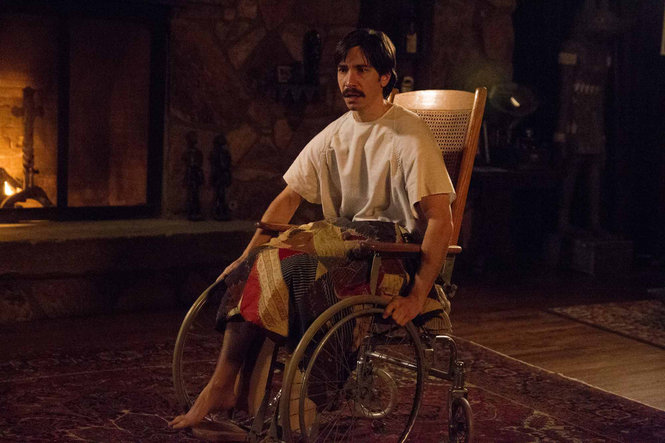'Tusk': A Misbegotten Beast In A Misguided Film
By Joel Wicklund in Arts & Entertainment on Sep 20, 2014 6:00PM

Photo: Mark Fellman / A24 Films
The closing credits reveal why Tusk fails, despite being the most interesting Kevin Smith movie I've seen (a low bar, to be sure). The tonal inconsistency and wasted opportunities make perfect sense when a snippet of Smith's popular podcast plays as the credits trail off. You hear Smith and co-host Scott Mosier goofing on an online classified in which a homeowner offered a free room to rent ... on the condition the guest dressed like a walrus for two hours a day.
The ad turned out to be a hoax, but Smith and Mosier extrapolated a Human Centipede-like scenario, and then extended the possibility of making a real movie out of it to their fans. Naturally, the masses responded, "Yes, please," and thus Tusk.
Therein lies the problem. As his film career has diminished, Smith has compensated by becoming the fanboy's fanboy. From running his own comic book store to self-deprecating public speaking performances—with multiple podcasts and merchandising thrown in—Smith has cultivated a devoted following among self-professed pop culture nerds (who, of course, are now really the cultural mainstream).
Smith's immersion in this fan base is sincere, and his appreciation of his followers seems so as well. But his little audio nod to those hardcore fans at the end of Tusk shows he's more devoted to them than to the craft of filmmaking.
Despite some good moments and the most assured visual style I've seen from the director (he usually seems aesthetically indifferent), Tusk can't overcome its casually tossed-off origins. Horror-comedy is a great hybrid, but Smith is a blind man in finding the balance between the creepy and the comic. And some pathos with unclear motivation takes the movie further adrift.
Like so many horror films with a gruesome payoff, Smith creates a wholly unlikable protagonist so the only real stakes for the audience are in seeing the asshole get the payback he deserves. Poor Justin Long has overcome looking like a David Schwimmer clone and proven himself a very good actor in movies like Drag Me to Hell and After.Life. But no talent could overcome his part here—an obnoxious, unfunny, sophomoric podcaster who has traveled to Canada to exploit a guy who cut his own leg off in a viral video.
When that visit falls apart, he looks for another gimmick and finds it on a Men's room bulletin board. A man looking for a lodger promises to share amazing tales of his adventurous life. Long's character takes the bait and ends up in the lair of a colorful madman (Michael Parks) who intends to not merely make him dress like a walrus, but actually turn him into one.
Quoting literature and holding court like a Vincent Price-worthy villain, Parks is almost as good here as he was in Smith's last film, Red State (a truly great performance in an otherwise truly awful film). This time Parks has a lesser role, but at least it's in a slightly better movie.
If Smith had just been building to a Grand Guignol climax, Tusk might have worked as a gore-toon guilty pleasure. Certainly after the scattered, amateurishly edited Red State, it's nice to see him finally deliver some real atmosphere and effective visual composition.
The madman's wilderness estate has real flavor and there are actually some effective uses of the widescreen dimensions—a rare treat in an era when filmmakers often frame for tablet and smartphone displays instead of movie screens.
But then, Tusk takes a radical turn off its apparent road as Smith seems to try to give emotional weight to the backstory of Long's character, including a romantic triangle with his girlfriend (Genesis Rodriguez) and podcast partner (Haley Joel Osment, still baby-faced despite some added facial hair and girth). And then there is the big reveal. I'll extend a big SPOILER ALERT here, but you'd have to be pretty naïve to think a movie with this premise would not ultimately show you a walrus-man.
It does. And instead of the hilarious sight gag you might expect (and that the movie probably should have aimed for), the creation is a real heartbreaker. A brilliant design supervised by veteran makeup wizard Robert Kurtzman, and aided by Long's conveying intense torment with just his eyes and voice, the monstrosity is right up there with the insect/man/machine at the end of David Cronenberg's The Fly in its tragic repellency.
So, maybe Smith is actually brilliant and pulled the rug out from under those expecting a lark of a would-be cult film? If Tusk ended at that point, I'd give him the benefit of the doubt.
Instead, it goes off the road again, in a different direction this time, with much worse results. A major uncredited star (the secret is more than out, but Google it if you need to know) comes aboard and channels Jerry Lewis as a drunk, former detective from Quebec. The superstar has some amusing moments, but he's allowed way too much screen time, derailing all narrative momentum and draining the tragic impact of Kurtzman and company's impressive creation.
Back to that podcast snippet. Aside from taking viewers out of their suspended disbelief completely, it shows Smith probably intended the pathos as parody. But it doesn't play that way. Maybe the walrus-man is too visceral a thing to work in any comic context. Or maybe it's time for Smith to look at the parts of Tusk that do work, realize he was never all that funny, and resolve to make a real movie next time and leave directionless riffing for his podcast.
Tusk. Written and directed by Kevin Smith. 101 mins. Rated R. Starring Justin Long, Michael Parks, Genesis Rodriguez and Haley Joel Osment. Now playing in select theaters nationwide.